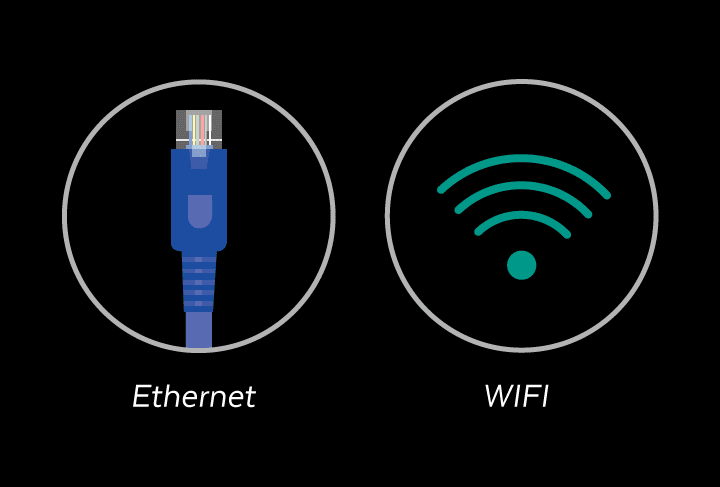The digital age has transcended the limiting feature of physical boundaries, and quite frankly, pushing these boundaries a little every time seems to be the norm. The question still remains: How far can we go to bring us closer? That brings us to the never-ending dilemma of having to choose between Ethernet and WiFi. A lot of people prefer WiFi either due to the hassle-free interfacing or unknowingly due to not knowing the wonder that Ethernet is.
With the emergence of a deeper IoT-based approach towards smart devices through our phones, it goes without saying that we will be relying more and more on the internet as time progresses for our basic life necessities.
These undoubtedly require a fast, secure, and stable network connection. The sudden boom in technology and gadgets has been making life convenient in some of the most incredible ways. No doubt the advent of technology is an aureole to all our lives. Still, it often casts a shadow of doubt and confusion regarding many aspects, which then requires at least a minimum of technical details and further details for coming out of the furrow.
When the world was crippled amidst this pandemic, the internet was the only sustenance for a functional world. On the same silhouette, a question was highly propelled amongst all, that is, which is the best- Wifi or ethernet.
When everyone was confined within the spaces of their homes, and there was no access to the unlimited high-speed internet at big offices and college campuses, people often found themselves in the furrow. One of the approaches is much more effective and pragmatic – installing Wifi or ethernet at homes?
Ethernet vs WiFi
Before we enter into the entire diagnosis, let’s skim through the basics. Read through the article, which takes you from the very basics of Ethernet vs WiFi to the final decisive bit.
What is WiFI?
Wifi- stands for Wireless Fidelity. As the name suggests, it requires no wired connection for functioning. Wifi saw its emergence in the 1990s, and then on, it went onto become the most popular choice. A Wifi transmits data over a wireless signal.
What is Ethernet?
Ethernet can be thought of as a way of connecting devices in a Local Area Network(LAN). It contains some fundamental devices in its working- an Ethernet cable, a router, crossover tables, a hub, et cetera. It then typically transmits data over the network of various connections and wires.
Ethernet and the question of cables
Ethernet, while being arguably one of the strongest networks, isn’t the most convenient. While WiFi can be set up by a simple tap on your phone if using the carrier or a WPS push button on your router. But with an Ethernet connection, things aren’t always as buoyant they seem. There isn’t a way to connect your mobile devices with an Ethernet cable yet. Still, it comes with some added benefits over contemporary WiFi connections and credit where due has better reliability all year round and lower latency, which renders an Ethernet connection the perfect candidate for multiplayer gaming and should most definitely be on your radar if you are considering investing in a gaming rig.
Now that we have drawn a basic sketch of both the entities, let’s dive into the vast sphere of comparisons between them. Wifi and Ethernet connections come along with their own perks and challenges. The sole credibility of either one is largely dependent on the user. But it will not be enough justification if we do not scavenge upon some of its contrasting features.
Security
Security is a big player in the market when we talk about the recent advances in the technological sphere. As daily users of the internet, we all are often concerned about how safe our data and credentials are. Thus, this makes security the next big parameter to decide upon. As already discussed, the ethernet is spread over a network of wires which are connected to a source system. The wires are insulated, and blocking the signals is an impossible task. One can access the details only if physically attached through the wires.
But when we talk about Wifi, the issues regarding the security are quite sensitive, as in Wifi, and the transmission is through the air, which can be easily blocked and intercepted. In order to save yourself from that use. The most secure encryption method is the WPA2-PSK, while WEP is the least secure. In a nutshell, all that can be comprehended can be said that Wifi is not much of a safe player, mostly when it comes to highly sensitive areas like company offices, et cetera.
Speed – Ethernet vs WiFi
The Ethernet initially had the upper hand over WiFi network in terms of speed and practically still does, for the most part, though theoretically cable setups such as cat5 are quickly losing ground to newer WiFi standards such as 802.11ac that allow for speeds up to 866.7 Mbps compared to 1 Gbps of the cat5.
To get around this threatening roadblock, Ethernet cable cat6 was rolled out, which has a maximum speed of a whopping 1 Gbps, which would seal the fate of this particular discussion for years to come. Not only this, same address file transfers to family connections are significantly faster done with the Ethernet than the WiFi.
An attribute on which the pedestal of the entire technological world stands on. The speed becomes one of the decisive factors when you choose between Wifi and ethernet. With extravagant advances made in the sphere of the bandwidth provided, Wifi with 802.11ac offering a speed of 3,200 Mbps is the most newer one. Taking into consideration the wider picture of popularity and feasibility, the finest of Wifi ranges of a theoretical value of 6.9Gbps, while the authentic speed is somewhere around 1 Gbps.
For devices that backup to NAS, the same hard drive, or a backup server, it makes more sense to use an Ethernet connection over WiFi due to the speed and time constraints. Plus, if you have a device such as Plex that automatically detects media streams from your network, you should consider investing in an Ethernet connection to see a considerable difference in your streaming quality and latency.
Latency – Ethernet vs WiFi
Latency has to be the most overlooked factor when opting for a wireless network. Speed isn’t the only thing that matters. You’d be wanting a seamless experience if you’re willing to shell out a hefty sum to hit the fastest speeds in town. Simply put, latency refers to the time taken by a packet of data to travel from the client to the server (or a device to its destination).
The higher the latency, the slower things work. Latency is particularly a matter of concern for the gaming community, which refers to it as “ping,” which plays spoilsport throughout the match. Ethernet connections being wired and plugged into the system offer a much lower latency than their WiFi counterparts.
A quick way to find out the latency of your network is to open Command Prompt on your windows device, type ping followed by your IP address. Try to compare both WiFi and an Ethernet network and see for yourself.
Interference – Ethernet vs WiFi
WiFi being the wireless network it is, can be influenced by other networks around it, causing problems such as lag. A concise list of problems exacerbated by interference is given below:
Dropped signals: WiFi often loses signal for a short period of time and has to reacquire it after a delay lasting anywhere from a few seconds to a few minutes. While this might not be a matter of grave concern for a streamer or someone who casually likes surfing, those who have experienced it in-game can vouch for it, contributing to a bitter gaming experience.
High Latency: Detrimental to streaming and gaming.
Lower Speeds: Interference lowers the signal quality and hence connection speeds. No one likes when their video or OTT buffers, let’s be honest.
Reliability – Ethernet vs WiFi
Reliability is probably the most important factor to decide in recent times. Amidst this situation when everything, starting from the team meetings to classes, to exams, everything is over the internet, a reliable source is very much essential. This factor is probably the most subjective parameter is this. Reliability can be deciphered in terms of connectivity stability, convenience in usage, and infrastructure requirements.
Ethernet cables in proper conditions provide effortless network connectivity over a large distance, both in height and distance. There is a certain threshold at which the connectivity can be disrupted as it gets interfered with radio/electrical signals. In a domestic setup of ethernet, ensuring proper wiring and a safe distance from electrical appliances often gets done with these issues.
While on the other hand, there have been huge grievances reported all around, wherein 2.4gHz band of Wifi gets interfered with that of the neighbors in any suburban area. Wifi has a slight edge on Ethernet when it comes to installation and usage. For an Ethernet connection, you have to ensure consistent wiring and sit at a certain distance. Mobility is not a great option when it comes to the ethernet connection.
The Verdict:
If you’re just a normal user that does a bit of browsing and occasional light gaming, then an optimized WiFi router will get the job done. But if that’s not the case and you are a gamer that plays like there’s no tomorrow and like your life depends on it, you’d want to catch up with the Ethernet train. The same goes for anyone wanting a seamless, ping-free video streaming experience and for anyone in general who’s concerned with security because you can never be too sure about what’s going to go wrong.
Many modern wireless routers feature Ethernet ports, which make it easier to transition and make the big leap into Ethernet and configure devices without hassle.
Ava Smith can usually be found reading a book, and that book will more likely than not be a romantic fantasy. Writing a novel was always on her bucket list, and soon, it will become a reality. When not absorbed in the latest heartwarming page-turner, Ava loves cooking, knits very badly, enjoys riding her Vespa around town, and otherwise spends far too much time at the computer, especially on sites like IP Router Login. She lives in the States, with her sister and a cute little kitten named Zazzles.




